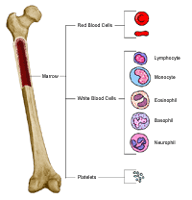Fanconi Anemia
Fanconi anemia is a blood disorder in which the bone marrow doesn't make enough blood cells or makes abnormal types of blood cells.

Bone marrow is the spongy material inside bones that produces white and red blood cells and platelets. Red blood cells carry oxygen through the body, and white blood cells help fight infection; platelets help with clotting. All these cells die after a certain amount of time and constantly need to be replaced.
Facts about Fanconi anemia
Fanconi anemia is a genetic condition. That means it runs in families—it is passed from generation to generation. Most people with Fanconi anemia are diagnosed between ages 2 and 15 years old. People who have this form of anemia may only live for 20 to 30 years. But, medical advances are making better treatment possible.
Having Fanconi anemia increases the risk for certain types of cancer, such as leukemia. As children with this type of anemia grow into adults, they are at increased risk for other cancers, such as tumors in the mouth or esophagus; women are at greater risk for reproductive organ cancers.
Causes of Fanconi anemia
Thirteen genes have been linked to the disease. If one of your parents had Fanconi anemia, you might carry the gene and could pass it on to your children even if you don't have the condition. Two groups of people, Ashkenazi Jews and Afrikaners, have a much higher risk of developing the disorder.
Symptoms of Fanconi anemia
These are possible signs and symptoms of Fanconi anemia:
-
Birth defects involving the kidneys, hands, feet, skeleton, spine, vision, or hearing
-
Low birth weight
-
Difficulty eating
-
Lack of desire to eat
-
Learning disabilities
-
Delayed or slowed growth
-
Small head
-
Fatigue
-
Anemia or low blood counts
-
Bone marrow failure, also called aplastic anemia, meaning that your body does not make enough red blood cells, white blood cells, or platelets. When your body doesn't make enough red blood cells, you can develop anemia. When your body does not produce enough white blood cells, you are at risk for infection. Finally, if your body does not make enough platelets, you are at risk for bleeding problems.
Other symptoms may appear later. For example, women with Fanconi anemia may menstruate later than their peers and have difficulty getting pregnant or carrying a child to term, or they may begin menopause early.
Complications of Fanconi anemia
Fanconi anemia may lead to:
-
Delayed growth or development
-
Infection, especially pneumonia, chickenpox, and hepatitis
-
Fatigue
-
Digestive problems
-
Certain cancers
-
Death
Diagnosis of Fanconi anemia
Fanconi anemia usually is not diagnosed at birth, although children are born with it. A diagnosis is often made based on:
-
Family history
-
Personal medical history
-
Symptoms
-
Growth and milestone measures
-
Blood tests
-
Bone marrow testing
-
Genetic testing. You may be advised to see a geneticist, a doctor who specializes in diseases that pass from a parent to a child through genes. The geneticist can give you specialized testing. Brothers and sisters of a child with Fanconi anemia should also be tested.
Treatment of Fanconi anemia
Doctors have numerous approaches to treating this anemia. Depending on your age and how well your bone marrow is working, these are possible treatments:
-
Antibiotics to help fight infection
-
Surgery to correct birth defects or digestive problems
-
Blood transfusion (considered a short-term option)
-
Medications to help the body make blood cells more effectively
-
Blood and marrow stem cell transplant, in which you receive blood cells from someone else. If successful, these donated cells will allow your body to make red blood cells, white blood cells, and platelets on its own.
-
Androgen therapy
-
Synthetic growth factors. These are medications to help your body produce more red blood cells, white blood cells, and platelets.
-
Gene therapy
-
Screening for high-risk cancers
Your child's medical team will determine the best course of both short- and long-term treatment for your child.
Online Medical Reviewer:
Date Last Reviewed: 8/14/2013
© 2000-2020 The StayWell Company, LLC. 800 Township Line Road, Yardley, PA 19067. All rights reserved. This information is not intended as a substitute for professional medical care. Always follow your healthcare professional's instructions.
